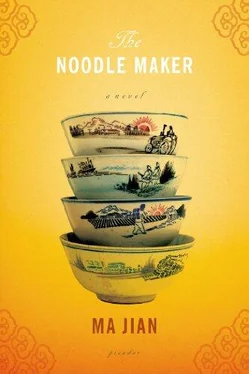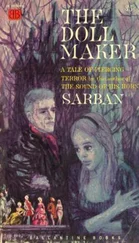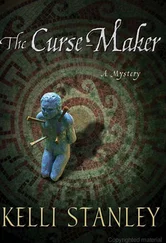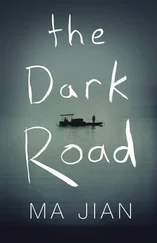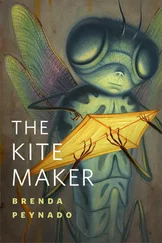She felt distanced from these remarks. Reading them now, they seemed to her like the vague and shadowy dreams that drift away upon waking from a deep sleep. She found it hard to separate the stories she had written from the events in her real life. But already she saw herself as the lead actress in her play, and the only member of her audience.
Gradually, she felt that her life was being taken over by her character in the play, or that she had somehow become that character in real life — a failure of a woman who had the impertinence to tell others how to lead their lives. Her different selves suffered from different afflictions, making it impossible for her to know where she stood in relation to others. She longed to escape and free herself from her troubled existence. She tried taking an overdose of sleeping pills, but didn’t manage to lose consciousness. Later, she consulted the works of Heidegger, hoping to use his philosophy to untangle the mess in her mind, but after wading through a couple of tomes she discovered that Heidegger was even more confused than she was.
Realising there was no other choice left for her, she made up her mind once and for all to take her life during a suicide attempt.
‘If only everyone could get on with each other!’ she cried.
She wanted to go and talk to the painter, the man she both loved and pitied. But ever since he started looking after the three-legged dog, he seemed to have lost interest in her. All she could do now was write her play, incorporate him into the narrative (whether he liked it or not), then kill herself for him, to fill the emptiness in her soul.
Her play embarrassed her. She was afraid of looking back over what she had written because she knew there was little difference between her life and her script. Looking back would have been tantamount to returning to her past. The self in the script was tainted with all her own traits and experiences. She grew accustomed to calling the woman in her script ‘I’.
As the weeks passed, she felt like an old bunch of grapes that was fermenting in the sticky mess of life, waiting to distil into a pure and transparent wine, then evaporate into thin air.
‘The vagina is a very depraved dance-floor,’ she scribbled in her notebook.
Her thoughts drifted back over the last decade. The painter was probably her longest-staying partner on this dance-floor. The other men who turned up occasionally, including the professional writer, the blood donor and a friend from drama college, only stayed long enough to dance a tango or a jig before retreating into the background. Although she was unwilling to include these minor characters into her play, she couldn’t wipe them from her memory, and in the end they somehow or other managed to find their way onto the page. As she constantly oscillated between her script and her life, her mind became confused and feverish.
When she was not working on her play, the emptiness that engulfed her at dawn, at midday, and especially on summer afternoons, dragged her spirits down. She suspected that her writing was merely an excuse to waste time. ‘Everything I bring to completion is dull and meaningless,’ she wrote to herself several times.
But she needed to keep writing. Although she knew she had little control over her actions, she sensed she was somehow participating in them. She suspected that the professional writer was secretly writing about her, and this increased her unease.
‘It’s God’s fault. He is the cause of all this trouble,’ she cried out from her script. ‘Why does He punish me in this way? First I lived within His lies, then I lived within my own. Now I’m not sure whether all of this is just a lie too. I have to assume that everyone feels this way. You ask me why I lie. Well I could ask you, “Why should I not lie?” Have you not heard any of His lies yet?’
Once she had calmed down a little, she lowered her head and thought for a while, then started to plan the stage design for her play.
‘The backdrop of the stage is a single piece of hardboard,’ she wrote in her notebook. ‘If there is a clock in the props department, hang it up. If not, paint one, but make sure to attach metal dials to it. When the clock strikes the hour, the stagehands must rush behind the hardboard and turn the dials to eleven. (A mark should be painted behind the clock to show them how far to turn.)
‘Dress: The female lead should wear one of the chiffon nightgowns criticised in the latest Open Door Policy memorandum. If the club’s Party secretary permits, the top three buttons can be left undone and the sleeves rolled up a little. Deal with this matter in accordance with current levels of reform. The chairs should date from before the campaign against the “Four Olds”. The Party secretary must understand that the female lead is corrupted by the evils of Bourgeois Liberalisation, and is not fit to sit on a revolutionary-style chair. The table in the corner of the room can be fake.’
From the piles of paper on her desk, she picked up a few pages of script and started reading them aloud. It was a scene in which her alter ego, Su Su, is visited by Li Liao and Old Xing — two characters based respectively on the professional writer and the blood donor.
A small single room in the actors’ quarters above the Jiefang District art centre. LI LIAO: [Knocks on the door. ] Su Su! [ Knocks again. ] It’s me! [ SU SU gets up slowly from her chair and walks towards the door. ] I waited two hours for you in the restaurant. I thought something must have happened to you. [ LI LIAO walks in and stands beside SU SU’s chair. His lined face resembles a walnut. SU SU averts her gaze and links her hands across her chest. ] LI LIAO: What’s the matter? [ He notices the awkward expression on her face. ] SU SU: Old Xing’s just been round. LI LIAO: So? SU SU: I said yes to him. I said I would marry him. [ The actor playing LI LIAO can improvise on his expression here, but should not resort to knocking the chair over. ] LI LIAO: We’ve been seeing each other for nearly a year now, and we’ve never had a row. Why would you want to marry him? SU SU: The fact is, I don’t love you. LI LIAO: But you told me you loved me. SU SU: So what? Why do you believe everything I say? Didn’t you say yourself that women are incapable of telling the truth? LI LIAO: I have grown used to the way your words differ from your actions. In fact, I’m starting to find it quite sweet. SU SU: I’m sorry, women are made of salt, not sugar …
Su Yun carried the pages to her bed and lay down. In the rehearsal room below, the art centre’s orchestra was tuning up. She lit a cigarette with one hand and continued reading the script.
LI LIAO: How can you marry him? Do you really think he’s better than me? When he stands up straight, he doesn’t even reach your shoulders. Is it because he’s got money, and his pockets are stuffed with Foreign Exchange Certificates and egg ration tickets? Or are you playing one of your little games? Is this just another act?
The orchestra below swelled in a sudden crescendo. It sounded like an earthquake. Above the roar, a soprano belted out flirtatiously: ‘The girls are as pretty as flowers. How the men love to gaze upon them! …’
Su Yun could no longer hear herself speak. She repeated: ‘Is this just another act?’ at the top of her voice, but the words were drowned by the music.
She listened to the French horns and trombones struggling to play in unison. The drums were so loud they made the floorboards shake and the old lamp on her desk flicker. She noticed an eye of the white cat in the framed picture on her wall turn from blue to red.
LI LIAO: What did I do wrong? SU SU: Don’t ask, don’t ask. [ She is almost shouting now, but her expression is still calm. ] We should call it a day. I stopped loving you ages ago. I only said I loved you when I was caught in the heat of the moment. It didn’t count. LI LIAO: Does what you say now count? SU SU: Yes. LI LIAO: I don’t believe you! I’ve heard you say all this a hundred times before. [ They glare ferociously at one another. SU SU’s fierce expression is out of keeping with her flowery nightgown. The stagehands should prepare to turn the dials to eleven when the clock strikes the hour. ] SU SU: It’s getting late, you should be on your way. [ Just as LI LIAO is about to storm off stage, OLD XING walks through the door. This man is short and deathly pale. He is dressed in a Western suit and platform heels. Standing next to him, LI LIAO looks like a tramp in his tattered shirt and scruffy plimsolls. OLD XING leans down, pulls out a present from his bag and, with both hands, offers it to SU SU. ] OLD XING: This is for you. It’s a pack of imported cigarettes. SU SU: Thank you. Don’t bother taking your shoes off. Come in, come in!
Читать дальше
